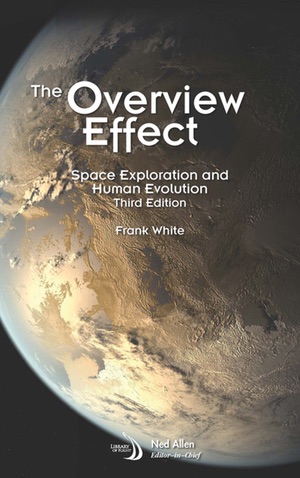Review: The Overview Effectby Jeff Foust
|
| Suborbital space tourists “will have to be much more open to the experience if they are only there for five minutes,” Magnus told White. “I think it will make an impression.” |
Today, the concept of the Overview Effect has won wide acceptance in the space community, as more space travelers report experiencing that change in perception once in space, one that minimizes the day-to-day conflicts and struggles among people on Earth by putting humanity in the big picture of the solar system, galaxy, and universe. White, though, continues to refine the Overview Effect concept, and its broader philosophy, in a third edition of the book recently published by the aerospace industry organization AIAA, which also published the book’s second edition in the late 1990s.
White continues to talk to astronauts to get their perspectives on their spaceflights and whether they experienced anything like the Overview Effect. Nearly half the book consists of transcripts of interviews White has done with dozens of people, including some who have flown since the second edition was published. Like earlier astronauts, more recent space travelers have reported experiencing the Overview Effect (although one issue not probed in the latest edition is whether astronauts, more aware of the concept, now expect it.)
A bigger change between the second and third editions, though, is the rise of private human spaceflight, through space tourism ventures. Such ventures have the potential to introduce the Overview Effect to many more people, over a much wider range of the population than existing professional astronaut corps. White doesn’t interview any of the people who paid their way to the International Space Station since the early 2000s, although he does interview Sir Richard Branson and Virgin Galactic CEO George Whitesides and his wife Loretta. While Branson and the Whitesides have yet to fly, they are big believers in the concept of the Overview Effect.
However, will the brief suborbital spaceflight that Virgin Galactic offers, where people will spend only minutes in space, be enough to allow people that experience? Astronauts who have previously reported that experience got to spend days, weeks, and sometimes months in orbit. White is optimistic even a suborbital spaceflight should be sufficient. He notes Alan Shepard, on his Mercury suborbital flight in 1961, was surprised by the “astonishing view” he saw of the Earth during his brief flight, although it’s debatable whether that triggered anything like the change in perspective that other astronauts who spent more time in space reported.
In one of White’s interviews, former astronaut Sandy Magnus sounds optimistic that least some suborbital spaceflight participants will experience the same shift in perspective that she and other orbital astronauts did. “We were out there longer, and they will have to be much more open to the experience if they are only there for five minutes,” she told White. “I think it will make an impression.”
| “I have come to believe that if the Overview Effect is a change in perception that you get from physically seeing the Earth from space and in space, the Orbital Perspective derives from that experience and drives what you do with it,” Garan writes. |
White emphasizes in the book that the Overview Effect is not an end in and of itself, but a means to an end: a shift in perspective that should be acted upon to make changes back here on Earth. He spends much of the book to construct a philosophy based on the change in perspective and awareness the effect creates.
A somewhat different, and more succinct, concept is provided by astronaut Ron Garan in the foreword to this edition of the book. Here, he describes what he calls the “Orbital Perspective”, which he says grows out of the Overview Effect that he experienced in space. “I have come to believe that if the Overview Effect is a change in perception that you get from physically seeing the Earth from space and in space, the Orbital Perspective derives from that experience and drives what you do with it,” he writes. (Garan has also written a book about the Orbital Perspective, due out next month.)
A lot of that philosophy may seem a little too touchy-feely for many people, who are more interested in the more concrete engineering, scientific, and business aspects of spaceflight. Yet, as The Overview Effect demonstrates, many people who have gone to space have been changed by the experience. If private ventures allow many more people to go into space in the next several years, and if at least some of them do experience that same shift in perspective, that could have implications not just for the space community, but the general public as well.
